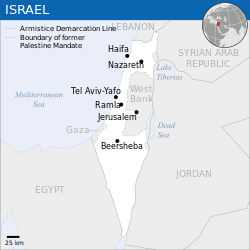Israel
The independent Jewish country founded in 1948 as a homeland for all Jews
Israel, officially the State of Israel, is a country in West Asia. It shares borders with Lebanon to the north, Syria to the north-east, Jordan to the east, Egypt to the south-west, and the Mediterranean Sea to the west. It occupies the Palestinian territories of the West Bank in the east and the Gaza Strip in the south-west. Israel also has a small coastline on the Red Sea at its southernmost point, and part of the Dead Sea lies along its eastern border. Its proclaimed capital is Jerusalem, while Tel Aviv is the country's largest urban area and economic center.
State of Israel | |
|---|---|
| Anthem: הַתִּקְוָה (Hatīkvāh; "The Hope") | |
Israel within internationally recognised borders shown in dark green; Israeli-occupied territories shown in light green. | |
| Capital and largest city | Jerusalem (limited recognition) 31°47′N 35°13′E / 31.783°N 35.217°E |
| Official language | Hebrew |
| Special status | Arabic |
| Ethnic groups (2023 est.) | |
| Religion (2023 est.) |
|
| Demonym(s) | Israeli |
| Government | Unitary parliamentary republic |
| Isaac Herzog | |
| Benjamin Netanyahu | |
| Amir Ohana | |
| Yitzhak Amit | |
| Legislature | Knesset |
| Establishment | |
| 14 May 1948 | |
| Area | |
• Total | 22,072 or 20,770 km2 (8,522 or 8,019 sq mi) (149th) |
• Water (%) | 2.71 |
| Population | |
• 2025 estimate | 10,094,000 (93rd) |
• 2022 census | 9,601,720 |
• Density | 457/km2 (1,183.6/sq mi) (29th) |
| GDP (PPP) | 2025 estimate |
• Total | |
• Per capita | |
| GDP (nominal) | 2025 estimate |
• Total | |
• Per capita | |
| Gini (2021) | medium inequality |
| HDI (2023) | very high (27th) |
| Currency | New shekel (₪) (ILS) |
| Time zone | UTC+2:00 (IST) |
• Summer (DST) | UTC+3:00 (IDT) |
| Calling code | +972 |
| ISO 3166 code | IL |
| Internet TLD | .il |
Israel is located in a region known as the Land of Israel, synonymous with the Palestine region, the Holy Land, and Canaan. In antiquity, it was home to the Canaanite civilisation followed by the kingdoms of Israel and Judah. Situated at a continental crossroad, the region experienced demographic changes under the rule of empires from the Romans to the Ottomans. European antisemitism in the late 19th century galvanised Zionism, which sought a Jewish homeland in Palestine and gained British support. After World War I, Britain occupied the region and established Mandatory Palestine in 1920. Increased Jewish immigration in the leadup to the Holocaust and British foreign policy in the Middle East led to intercommunal conflict between Jews and Arabs, which escalated into a civil war in 1947 after the United Nations (UN) proposed partitioning the land between them.
After the end of the British Mandate for Palestine, Israel declared independence on 14 May 1948. Neighboring Arab states invaded the area the next day, beginning the First Arab–Israeli War. An armistice in 1949 left Israel in control of more territory than the U.N. partition plan had called for; and no new independent Arab state was created as the rest of the former Mandate territory was held by Egypt and Jordan, respectively the Gaza Strip and the West Bank. The majority of Palestinian Arabs were either expelled or fled in what is known as the Nakba, with those remaining becoming the new state's main minority. Over the following decades, Israel's population increased greatly as the country received an influx of Jews who emigrated, fled or were expelled from the Arab world. Following the 1967 Six-Day War, Israel occupied the West Bank, Gaza Strip, Egyptian Sinai Peninsula and Syrian Golan Heights. Israel established and continues to expand settlements across the illegally occupied territories, contrary to international law, and has effectively annexed East Jerusalem and the Golan Heights in moves largely unrecognised internationally. After the 1973 Yom Kippur War, Israel signed peace treaties with Egypt—returning the Sinai in 1982—and Jordan. In 1993, Israel signed the Oslo Accords, which established mutual recognition and limited Palestinian self-governance in parts of the West Bank and Gaza. In the 2020s, it normalised relations with several more Arab countries via the Abraham Accords. However, efforts to resolve the Israeli–Palestinian conflict after the interim Oslo Accords have not succeeded, and the country has engaged in several wars and clashes with Palestinian militant groups.
Israel's practices in its occupation of the Palestinian territories have drawn sustained international criticism—along with accusations that it has committed war crimes, crimes against humanity, and genocide against the Palestinian people—from human rights organisations and United Nations officials. The country's Basic Laws establish a parliament elected by proportional representation, the Knesset, which determines the makeup of the government headed by the prime minister and elects the figurehead president. Israel has one of the largest economies in the Middle East, and one of the highest standards of living in Asia. One of the most technologically advanced and developed countries in the world, it spends proportionally more on research and development than any other country in the world and is widely believed to possess nuclear weapons. It has the world's 25th-largest economy by nominal GDP and 16th by nominal GDP per capita.





